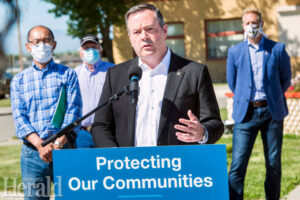Funding announced for recovery centres
By Lethbridge Herald on July 26, 2020.
 Herald photo by Ian Martens
Premier Jason Kenney, along with Minister Jason Luan, Mayor Chris Spearman and MLA Nathan Neudorf in the background, answers a question during Saturday's recovery communities announcement in Standoff. @IMartensHerald
Herald photo by Ian Martens
Premier Jason Kenney, along with Minister Jason Luan, Mayor Chris Spearman and MLA Nathan Neudorf in the background, answers a question during Saturday's recovery communities announcement in Standoff. @IMartensHeraldDale Woodard
Lethbridge Herald — standoff
The Province of Alberta is stepping up the fight against addiction in southern Alberta.
In an announcement Saturday in Standoff, Premier Jason Kenney announced a $10-million capital investment to support construction of two recovery communities in southern Alberta.
The construction of two recovery communities will add 125 new long-term residential addiction treatment beds in Lethbridge County and the Blood Tribe First Nation as part of Alberta’s Recovery Plan, which includes $25 million to support construction of five recovery communities. The government says the recovery communities, when completed, will play a critical role in supporting the health, wellness and long-term recovery of Albertans.
“Last Saturday we announced the first of these new treatment facilities, a 75-bed, fully-equipped recovery community in Red Deer,” said Kenney outside the Kainai Continuing Care Centre.
“Today, I am pleased to announce that Alberta taxpayers are investing more than $10 million to build two new recovery communities here in southern Alberta. These include a $5-million investment for a 75-bed recovery community on the Blood Reserve and another $5 million for a 50-bed recovery community in Lethbridge County.
“In addition to these recovery communities we will dramatically expand access to medical detox in the region. This includes an additional $1,000,000 annually to upgrade 16 detox beds at the Foothills Centre in Fort Macleod and an additional $1.2 million annually to add up to 15 detox and transition beds in the City of Lethbridge.”
The project is part of the more than $10 billion infrastructure spending announced as part of Alberta’s Recovery Plan, including $6.9 billion Budget 2020 capital spending, $980 million accelerated for Capital Maintenance and Renewal, $200 million for Strategic Transportation Infrastructure Program and water infrastructure projects, $600 million in strategic infrastructure projects and $500 million in municipal infrastructure.
Recovery communities, also known as therapeutic communities, are a new state-of-the-art approach to addiction treatment and recovery, said Kenney.
“It’s a long-term holistic treatment for people struggling with substance abuse, trauma and mental- health issues. It has been successfully used in 65 countries around the world. This is very different from what we’ve sometimes seen in Canada where people detox, but then they can’t get into a treatment centre or they get into a treatment centre and treatment only lasts three or four weeks and before they know it, sometimes they are back and trapped in addiction.
“This is about a long-term approach that could be months and months of holistic support. People entering into recovery communities are given every opportunity and encouragement to take control of their addiction, to achieve sobriety, to improve their health and to reconnect with their loved ones. They rediscover personal accountability, self-reliance and compassion for others injured by their actions and the love of those who care for them.”
The recovery community on the Blood First Nation will be operated by the team that already operates the Bringing The Spirit Home program.
Kenney said an expert panel was appointed to assess the social and economic data and the impact of drug consumption sites.
“This was a panel made up of addictions experts, people in recovery from addiction, people who have lost family members to addiction, academics, scholars, medical experts, law-enforcement personnel and folks from the business community,” he said.
“They came back with hard evidence that many of the drug consumption sites around Alberta ended up creating significant negative damage on local neighbouring communities, on the economy with an increase in crime and in some places an increase in death in nearby areas.
“That report raised serious concerns about the operation of the ARCHES consumption site in Lethbridge, the largest drug consumption site in the province, which led to this month’s shocking audit report alleging financial malfeasance at ARCHES, including what appears to be some people profiting personally from the misery of others suffering from drug addiction.
“I think this is disgusting, it is outrageous and I condemn that kind of behavior. That is why Alberta government is withdrawing funding from that organization. There will be a seamless transition to services and that is part of what today’s announcement is about.”
Onhand at Saturday’s announcement Lethbridge mayor Chris Spearman welcomed the new approach.
“Today we’re hitting the reset button. We need to have programs that people have confidence in. We need to give people hope and a chance to have meaningful lives. The announcement today is a new way of doing things. We’re going to work with our regional partners and work with the folks in Fort Macleod and Lethbridge County and right here on the Blood Reserve. We’re going to make sure everybody has an opportunity. We talk about reconciliation, we try to find meaningful reconciliation. Meaningful reconciliation means working together to solve problems we share. Addiction doesn’t end at the border in our communities. We need to work together. I’m willing to do that and will work with the provincial government and our Indigenous neighbours and make sure we can all succeed and save lives.”
Kenney estimated the creation of roughly 50 jobs in the building of the two facilities.
Once operational, each recovery community will employ 35 to 40 people.
“I look forward to working with the city, the county and the First Nation on ensuring these get done as quickly as possible,” said Kenney.
Follow @DWoodardHerald Twitter
-1




